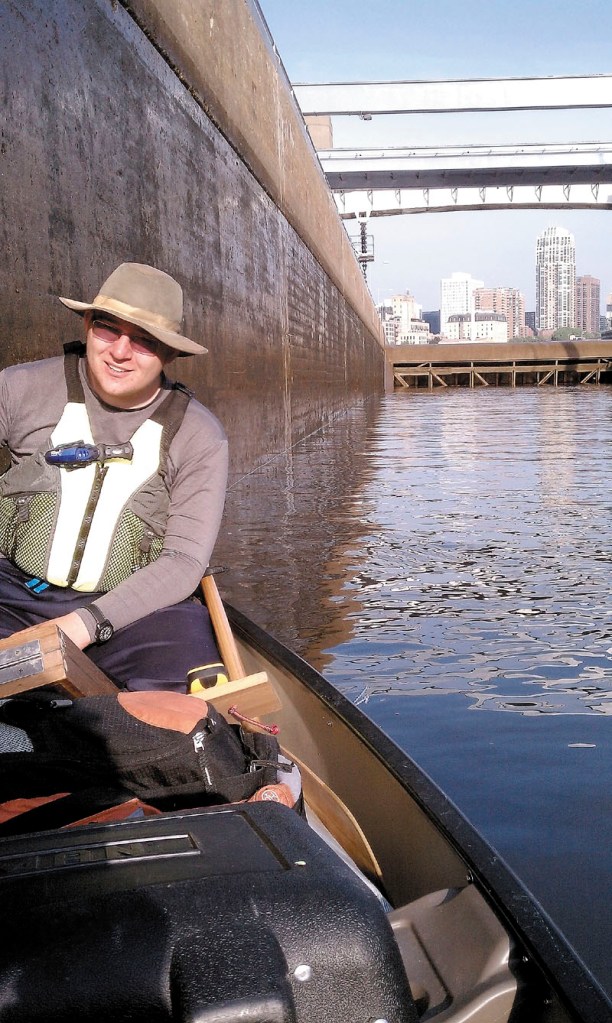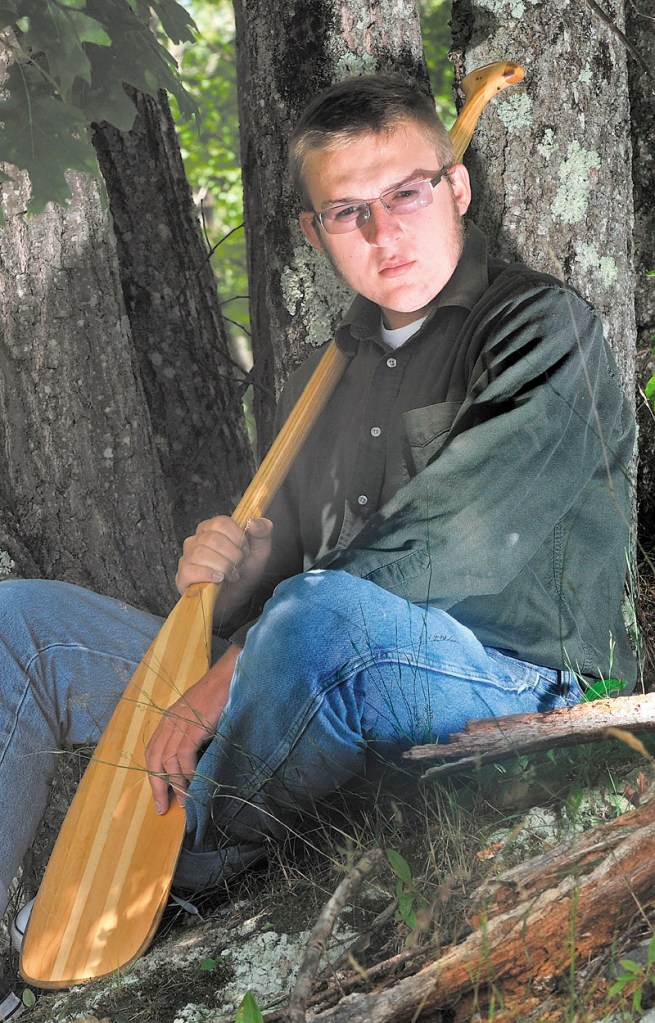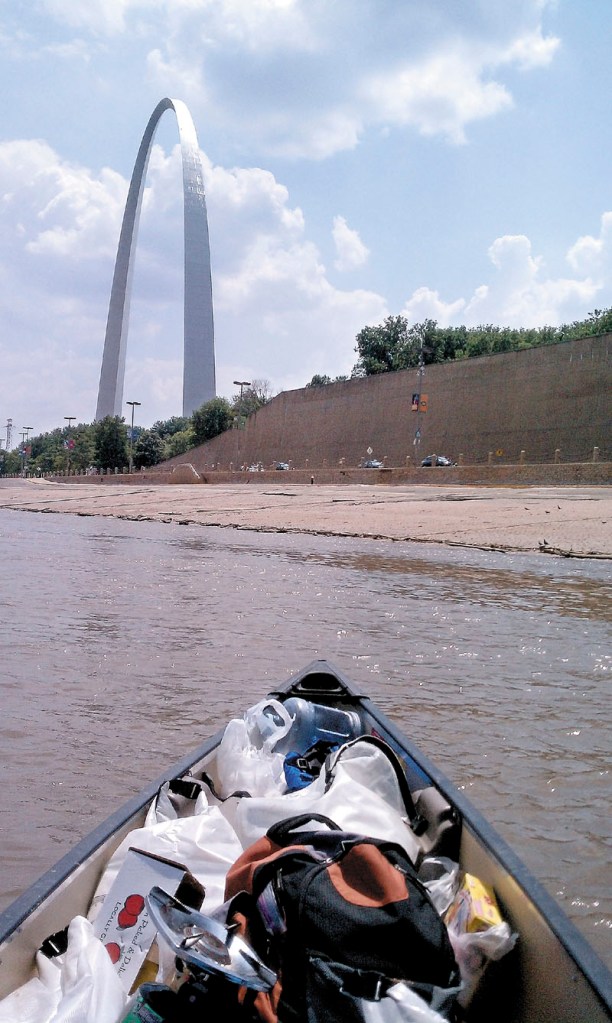Like many kids his age, 17-year-old Benton Purnell, of Oakland, spent the bulk of his summer listening to audio files through his headphones.
But unlike other kids, he listened to classic works of literature instead of popular music.
While paddling a canoe down the 2,350-mile Mississippi River.
Much of it alone.
When Benton began his voyage, he didn’t have much experience for a long solo trip. The closest he’d come was two weeks on the Allagash with a local church group.
Benton was overweight, with eyeglasses perched on his nose and soft hands more used to paper-shuffling than canoe-paddling.
His father, Ronald Purnell, said that he encouraged Benton to blow off some steam by having an adventure during the summer break.
“I didn’t really mean that much of an adventure,” he said.
Benton began on May 4 in the headwaters of the Mississippi River in Minnesota. He floated all the way to New Orleans, where he donated his canoe and all of his equipment to a local Boy Scout troop.
Right from the start, Benton and his father, who joined him for the first two weeks, faced challenges including fallen trees, unnavigable marshes and waterfalls.
At each obstacle, the canoe had to be unloaded, carried for as much as a half-mile portage, and reloaded, an exhausting and time-consuming process that soon had the pair ditching their equipment.
“Three times, we decided to offload,” Ronald said. The final offload was Ronald himself, in Minneapolis, and Benton pressed on alone for two more months.
Benton’s contact with his parents from that point on was limited.
He kept in touch with his parents by pushing a button on a satellite transponder every few hours. He could push different buttons to indicate that he needed help, or was doing well, or was camping for the night, and the transponder would send a message to his anxious parents with his precise location.
“Him having that was really very comforting. Even when there’s no cellphone, he could spot to us,” said Ronald.
Life on the Mississippi
While every day brought fresh challenges, Benton soon fell into a routine.
His days were filled with as many as 14 hours of paddling, during which he listened to audio books, including classics “20,000 Leagues Under the Sea,” “The Last of the Mohicans,” “Around the World in 80 Days” and “The Time Machine.” He also listened to the “9/11 Commission Report,” German philosopher Friedrich Nietzsche’s “Beyond Good and Evil,” a collection of poetry and, of course, Mark Twain’s “Huck Finn.”
Food was more of a chore than a pleasure, especially after the first month, when he ran out of propane for his stove. He rarely had the energy to collect wood and build a fire.
“I never ran out of food, but there were times when I only had instant mashed potatoes,” he said. “There were points when I would rather starve than eat more instant mashed potatoes, especially since I often had to eat them cold.”
Benton learned to watch for church steeples peeking over the levee, his only clue that he was close enough to a town that he could hit a convenience store or gas station for food.
“They have 100 different variations of Fritos and Twinkies, and only one can of soup,” he said. In addition to the mashed potatoes, he said that he consumed massive quantities of Ramen noodles and Spam.
Usually, Benton pitched his tent to sleep on sand bars that formed on the inward curves of the river. The sandbars were also popular with animals looking for an easy way to the water.
Elemental experience
While there were occasional rushes of adrenaline, the elements and a never-ending parade of bugs were Benton’s worst trials, including leeches and ticks.
He removed hundreds of ticks from his body and four times he used salt to remove leeches from his legs.
“The mosquitoes were horrendous,” he said. “Not so much during the day, but as soon as the sun went below the horizon, you had 30 seconds before they were all over you.”
He also battled a constant, and losing, fight with moisture.
“The rain collects into the bottom of a canoe. No matter how perfectly sealed things are, everything is going to get wet,” he said.
There were times when he tried desperately to start a fire while shivering violently, hoping to dry out his sleeping bag.
Other times, as he went farther south, he baked in 105-degree temperatures. Then, he would gaze longingly at the river water, polluted and undrinkable.
The low point came one evening when he found himself in a thunderstorm and, with lightning on both sides of the river, couldn’t risk staying out on the open water but he didn’t have time to pitch a tent. His spent a miserable two hours hunched beneath a tarp on a sandbar, his back against the canoe.
Surprising encounters
Once, when the river was so narrow that he could touch each bank with a paddle, a wolf ran up to the shoreline to inspect Benton and his father before loping off into the woods.
“It looked like a husky, but it was as big as a St. Bernard,” he said.
Another time a deadly water moccasin slithered under his upside down canoe for the night, and struck out at him the next morning.
Another time, a good-sized carp jumped into his canoe.
Surprisingly, some of his most frightening moments came at the hands of relatively benign animals. He was charged by an angry beaver and drew an attack from a duck defending her nest.
“I almost fell right out of the canoe,” he said.
Early in the trip, in the backwoods of Minnesota, the absence of people was the danger, with help hours or days away.
Later, it was the presence of people that were the danger.
Barges plowed through the waters up and down the center of the river, posing a risk for unwary paddlers. Benton was forced to move out of the current and hug the shoreline, where paddling was more difficult.
Sometimes, he was forced to share the center of the river with the lumbering barges, recalling a story he’d heard about a paddler who drowned after being run down by a barge. Just this April, St. Louis news outlets reported that two canoeists were rescued after a passing barge swamped their 18-foot boat.
Journey into adulthood
When Benton put his canoe into the headwaters of the Mississippi, he was still a boy. When he finally pulled his canoe out of the water for the last time on July 19, he had grown into a man, with the aches and pains to prove it.
“I’m sure I smelled pretty ripe when I got into New Orleans,” Benton said. “I hadn’t been in water for days.”
He was suffering from sun poisoning, blisters, multiple skin infections, and scores of bites from mosquitos, ticks, and leeches. Today, his arms are more muscled, his hands are calloused, and he has a new, trim figure.
Asked what he learned on the trip, he thought for a moment.
“I learned a lot about isolation, and what it means to be truly alone,” he said. “I got myself out of some very difficult situations knowing that even if I wanted to ask for help, it wasn’t forthcoming.”
Benton also learned something else.
“When I started, I thought the outhouses were horrendous and disgusting,” he said. “When I got to the end I said, ‘how wonderful — something to sit on.'”
Send questions/comments to the editors.






Comments are no longer available on this story